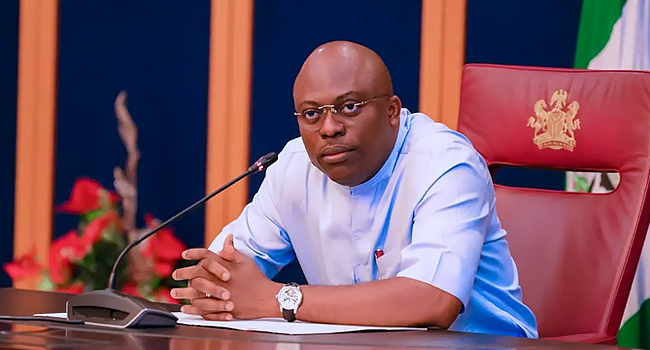Rivers State Governor, Siminalayi Fubara, ignited a political firestorm on Monday with a scathing attack on members of the Rivers State House of Assembly. In a televised address, Governor Fubara accused the lawmakers of lacking legitimacy and existing solely at his behest.
His incendiary remarks, delivered with a cold fury, stemmed from what his office described as a “pattern of antagonism” from the Assembly towards the executive branch. The specific issues that triggered the Governor’s outburst remain unclear, but sources close to the administration hinted at disagreements over the state budget and recent infrastructure projects.
“It has gotten to a time when I have to make a statement that they are not existing,” Governor Fubara declared, his voice tight with barely suppressed anger. “Their existence is me allowing them to exist. If I de-recognise them, they are nowhere.”
The Governor’s comments were a dramatic escalation of tensions that have simmered between the executive and legislature for months. Elected on the platform of the Peoples Democratic Party (PDP) alongside a majority PDP Assembly, Fubara’s relationship with the lawmakers soured after a series of disagreements over policy and spending priorities.
Fubara’s claim that the Assembly’s legitimacy hinges on his recognition is a legally dubious one. The Rivers State House of Assembly is an independent body established by the Nigerian Constitution. However, the Governor’s words carry significant political weight, particularly within the context of Rivers’ recent political history.
A Peace Accord and a Fragile Truce

Fubara’s reference to a “Peace Accord” sheds light on the underlying tensions. In 2019, the state witnessed a bitter political contest between Fubara and his main challenger. The aftermath of the election was marred by allegations of irregularities and violence. To quell the unrest, President Bola Tinubu intervened, brokering a peace accord between the two sides.
A key element of the accord was the recognition of the elected Assembly members, despite concerns raised by Fubara’s camp. Governor Fubara’s comments on Monday suggest that he views this recognition as a concession rather than a constitutional obligation.
Beyond Legality: A War of Words and Patronage Politics
While the legal basis for Fubara’s claim is questionable, his words hold significance within the murky world of Nigerian politics. The governor’s accusation that the Assembly members are “eating in my house” implies a web of patronage networks that underpin political power in the state.
Fubara’s suggestion that he once assisted some Assembly members financially, even before becoming governor, speaks to a system where loyalty is often secured through personal favors and financial support. By questioning the legitimacy of the Assembly, Fubara may be attempting to undermine this patronage network and assert his dominance.
Opposition Reacts with Fury
The governor’s tirade predictably drew a furious response from the Assembly. Speaker of the House, Honourable Kinikaa Daniel-Tula, convened an emergency session on Tuesday, where lawmakers condemned Fubara’s remarks as “undemocratic” and “an attack on the very foundation of representative government.”
The Governor has overstepped his bounds,” declared Honourable Daniel-Tula. “He cannot simply erase a duly elected body from existence with a few inflammatory words.”
The main opposition party in the state, the All Progressives Congress (APC), also seized the opportunity to criticize the Governor. APC chairman Chief Ogbogbula accused Fubara of “becoming increasingly dictatorial.”
The Governor’s comments show a complete disregard for the democratic process,” Chief Ogbogbula stated. “He is attempting to silence any form of dissent.”
Legal Challenges and Political Maneuvering
The Governor’s outburst has plunged Rivers State into a fresh political crisis. Legal analysts predict that the Assembly may challenge Fubara’s remarks in court, arguing that they constitute an attack on the legislature’s constitutional authority.
Beyond the legal battles, the Governor’s words are likely to further strain relations between the executive and legislature. The ability of the two branches to work together effectively on critical issues facing the state, such as security, infrastructure development, and job creation, will be severely hampered.
National Implications and the 2027 Elections
The unfolding drama in Rivers State carries national significance. With the 2027 general elections looming, the battle between Fubara and the Assembly is being seen as a microcosm of the wider struggle for political control in Nigeria.
The Governor’s actions could embolden other executives who feel frustrated by a perceived lack of cooperation from their legislatures. However, Fubara’s tactics may also backfire, alienating voters who value checks and balances within government.



